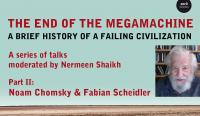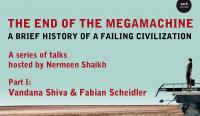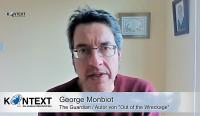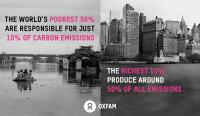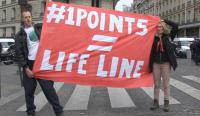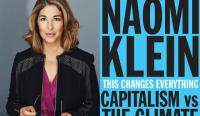David Goeßmann interviews Kumi Naidoo at COP 26 in Glasgow. We are living in the decisive phase of human history, Kumi Naidoo tells Kontext TV. The next ten years will decide our future. But there continues to be a huge gap between the climate crisis and politics, while we are running out of time, he says. Governments, often bought by fossil fuel industries, are as usual offering only incremental steps, but no sustainable transformation. But there is also a wave of resistance to the wrong course outside the negotiations.
Kumi Naidoo is a South African environmental and human rights activist. He served as secretary general of Amnesty International from August 2018 to December 2019. He was director of Greenpeace from November 2009 to December 2015. He was the first African to head the organization. Naidoo is currently a fellow at the Robert Bosch Academy in Berlin.
David Goeßmann: Welcome to Kontext TV. We are now talking to Kumi Naidoo here in Glasgow at the COP 26. Naidoo is a human rights and environmentalist activist from South Africa. He was director of Greenpeace International until 2016 and secretary general of Amnesty International until 2020. He is at this time fellow at the Bosch-Stiftung in Berlin. Welcome to Kontext TV, Kumi Naidoo.
Kumi Naidoo: Thank you very much. Thank you for having me.
David Goeßmann: It’s a great pleasure to have you. You have been fighting for a real solution to the climate crisis for a long time, committed to acts of civil disobedience, and were arrested. If you turn back, where do we stand right now, here at the COP 26 in Glasgow? Has anything changed in the last years concerning climate policies and also concerning the global movement to demand a rapid shift in course?
Kumi Naidoo: Thankfully, there is something that has shifted, which is that the number of people in the world who know understand that we need to act with urgency to address the climate crisis. There are many people who recognize what our governments don’t seem to recognize, that we are living in the most consequential decade of humanity’s history. What we do in the next ten years will determine what future we have or whether our children and their children will have a future at all. But I’m sad to say that if you look at where the science and extreme weather events are and where the politics and economics is, there is still far too big a gap. Our leaders are in denial that we are in fact running out of time and that we are one minute to midnight and the window of opportunity for us to act is small and is closing fast. Thankfully, there is a groundswell of resistance that is coming outside the COP, a little bit inside the COP, but we have a long way to go before we can get our leaders on side with us. Our leaders seem to believe that it’s still possible to make baby step changes and sell it as if they’re doing something big and basically they are trying to rearrange the deck chairs on the Titanic while humanity is sinking. And the approach of our leaders is still very much the same like we saw at the end of the global financial crisis, which was all about system recovery, system protection, system maintenance. What was needed then and what is urgently needed more so now is system innovation, system redesign, and system transformation. And sadly, the majority of our leaders in government are not up to the task because they are far too in the pockets of the fossil fuel industry. Let me just end by saying, do you know which is the biggest delegation at this COP?
David Goeßmann: The fossil fuel industry.
Kumi Naidoo: The oil and gas companies are twice the size of the largest government delegation, which is the UK government delegation. To put it in context: it’s like, imagine Alcoholics Anonymous were having a global conference and the largest delegation to that conference was the alcohol industry. That’s how crazy this COP is and that’s why Mary Robinson is correct when she says that this COP is male, pale, and stale, and it is the most elitist and exclusionary COP that we’ve ever seen.
David Goeßmann: Greta Thunberg just said that this COP is the most exclusive when it comes to representatives of the global south and indigenous people. Why is that?
Kumi Naidoo: That is because our global governance system, right, including the United Nations, is still dominated by the richest countries on the planet and they have – they say one thing, because the UK presidency said this is gonna be the most inclusive and most diverse COP and so on, but is actually completely the opposite. And they believe that if they say it often enough, that people will actually believe them. But I have to say, this one has been stunning. It’s because it’s all about power at the end of the day. Who has power gets here. And yeah, the cost of participation are very high, the ability to get your sort of accreditation. Yeah, I mean I heard a horrible story about an artist from the global south whose art has been displayed inside the COP but she has not got the registration to see her own art, for example. At a time when it’s clear that the wisdom of indigenous people is needed to help us get out of the climate crisis because indigenous peoples have understood for centuries, for millennia, that humanity’s wellbeing is when humanity can coexist with nature in a mutually interdependent relationship. And unless we get to that point we’re not going to win. And so – And also, people from the global south, frontline communities, indigenous peoples, when we have been inside, we say the uncomfortable things, we say – you know – we say that most of our so-called leaders are basically become agents of the fossil fuel industry. The fact that Transparency International, based in Berlin, who had to issue a statement just ten days before the COP started, calling on the UK presidency not to collude with the fossil fuel industry in the planning of the COP – even fossil fuel industry interests were involved in the planning of the COP as well. So you know, the power dynamic is one that excludes people, but just because people are not inside, the leaders here must recognize that the whole world is watching and they might get away with it now, in the next couple of days, and come up with a wishy-washy statement that you know they will pat themselves on the back and say we’ve done well – you can guarantee they’re gonna do that at the end, right? And sadly, even the poor countries will be forced into a situation to pretend that actually we made progress, but in reality progress can only be judged by what the science is saying. And the science is saying that we are far away from what we need and for that reason we need to broaden this resistance, build the movement even stronger than it is, and thankfully – to put it in a different way: our leaders must recognize that they’re playing political poker with the future of our children. They need to understand that nature does not negotiate. We cannot change the science. All we can change is political will and thankfully in quite a large number of countries, political will is a renewable resource in the sense that when people don’t perform we can get rid of them and I hope that those leaders that don’t deliver here, when they go back home, when they face elections, that their citizens will put them out of power and bring in people who recognize the urgency of the climate crisis.
David Goeßmann: Talk about climate finance, which is crucial for poorer countries. South Africa just got 8.5 billion dollars to phase out coal and invest in renewable energy. What is the significance of this financing and could it initiate real change in your view?
Kumi Naidoo: So, this package is a good, positive package, IF firstly the rich countries deliver what they said, which 80% of the time, they make promises and they have not delivered. Bear in mind it was in Copenhagen in 2009 that they said that they will make sure that there’s 100 billion dollars per year in the green climate fund. We are in 2021, one year later, that’s still not happened. We are not seeing the money for adaptation going to poor countries that they’ve promised. So if the money is delivered on time without strings attached, without political manipulation, that will be a positive thing and we hope that will happen. Because South Africa, my country, actually has also not done well and this will help accelerate the progress to get off coal, which absolutely we have to do. Then the other problem is what happens when the money gets there. We need to make sure that the South African government, and as a citizen I’ll be calling for this and pushing for this, that the South African government is held accountable for how that money – every cent of that money – is spent. And I call upon President Ramaphosa – as I’ve done in other interviews – to bring together senior leaders of civil society, religious leaders, and so on, to play a monitoring role to ensure that how this money should be spent is how it is spent, because sadly there has been industrial scale corruption and looting in South Africa. And right now we would be foolish to think that just because there’s money, all that money will be spent in the way that it needs to be spent.
David Goeßmann: Let’s go to the issue of carbon inequality. A study that just came out says that the carbon footprint of the world’s richest 1% is on track to be thirty times higher than what’s needed to limit global warming to 1.5 degrees Celsius. What follows from that in your view?
Kumi Naidoo: So this statistic about how the overconsumption by the people at the top of society is what’s driving the climate crisis is something that we need to come to terms with. You know, for example, when I was the head of Greenpeace, oftentimes people would ask me, including Greenpeace members in rich countries, so, Kumi, isn’t the big problem population? You know, the people in Africa and Asia are having too many babies, for example. And by the way, I believe that we need to address the population. And the way you address population is by ensuring full gender equality. If you work for full gender equality, population starts coming down and I support that. But actually, when you only look on population and you don’t look at consumption you get a very wrong picture. It probably takes at least one hundred in an African village to equal one child’s consumption in Berlin, for example. So, also this is a fact that outlines a troubling reality. And that is, the worst disease that humanity faces is not COVID, not influenza, or any other disease, it’s a disease that we could call affluenza. Affluenza is a pathological illness where people have been led to believe that a good, meaningful, decent life comes from more and more and more material acquisitions. So this is something that has to be addressed and that’s why it’s clear: we cannot get out of the climate crisis if we leave the current economic system intact. The current economic system has been what’s driven us to this point of climate catastrophe. And we need fundamental changes to our economic system, our energy system, our food system, our transport system, and so on. And anybody thinking that, oh, it’s just a question of a few minor changes, especially when we’ve left it for so late... If governments were responding to what the science was saying PRIOR to 1992, we might be able to say, okay, we can take it gentle. But now we are playing catchup. Let’s be clear: the terrible sad thing for somebody like me who comes from Africa, is being so aware that the people on my continent and the people in the global south have contributed so minimally to the problem, right, but are paying the first and most brutal price now. There are lives being lost now, there’s infrastructure being lost now, and, you know, look at this COP here, right? You know, where are those people, right, and unless we understand that the problem we’re facing is also climate apartheid – those parts of the world that contributed most to the problem have a particular complexion. Those parts of the world that are paying the first and most brutal price are mainly people of color. And why? We are not surprised that climate apartheid is what we should call it, because if ever we had any doubt how rich nations – against the wishes of their own citizens most of the time – they proved their colors, they’ve shown their colors in the way they have addressed the COVID crisis. The vaccine apartheid, which is both not in their own interest, because ultimately you’re leaving Africa, for example, as a variant factory, which could bring variants which the current vaccines might not be able to treat. As we stand here, people in Europe and North America and rich countries are getting ready for the third vaccine shot, right. And people in Africa – five percent of people in Africa – have got vaccines, right. So let’s understand that racism is alive and well in the climate negotiations. And we need to call it for what it is and not pretend that just because we all here are saying we are one family and so on that racism does not drive some of the injustices that we see at this COP.
David Goeßmann: You are calling together with hundreds of civil society organizations, Nobel laureates, for a fossil fuel nonproliferation treaty. Tell us about it and why you think that that could put pressure on governments, especially of the industrialized countries.
Kumi Naidoo: Given what the science is saying now, given what – even if the science wasn’t there, right – extreme weather events are speaking more powerfully than the science. First extreme weather events, fluctuations, droughts, and flooding were mainly in the south. Look, even a country like Germany loses people in a drought, right? One of the richest countries in the world is already losing lives from climate impacts, right? It’s happening on a bigger scale in the global South and so on. So people must recognize given what the science is telling us, that an investment of one cent in any new fossil fuel project is an investment in the death of our children. And in the death of the future. So essentially, this is not a fundamentally new call by the way. In 2015, President Anote Tong of Kiribass or Kiribati, a Pacific island, I was there with him in his home, looking at how vulnerable they are with sea level rise and they basically – and he joined – he led the call, calling on rich nations for a moratorium on coal, right? But right now, if we know that oil, coal, and gas are driving us to extinction, it is not rocket science to say we should stop doing it. You know, it’s not rocket science. And especially when we know that there are alternatives. And making the transition I’m not saying it’s click your fingers and we can make it. But with political will, with urgency, with resourcing and so on it can happen much faster and I believe a fossil fuel non-proliferation treaty will add impetus to that and I’m hoping that within the next short months many small, most countries of the what’s called the climate vulnerable forum – the poorest countries that are on the front line – will sign and then we call on the ethics of the rich countries. Like Europe, for example, likes to believe that they’re environmental champions, that they’re on the right side and so on. But bear in mind: Europe also fluctuates on this question. And I challenge the European Union: If they are as good on climate and environment as they think they are, and if they are representing the views of – I mean, there’s no question in my mind, having worked around the world, that citizens in Europe are amongst the most conscious about environmental issues, right, more so than most other parts of the world. And their governments are actually out of step with them quite a large time, right? And so I challenge the European Union to – as a block – sign the non-proliferation of fossil fuels treaty and start making the changes that they should’ve started doing long, long time ago.
David Goeßmann: A new global carbon removal partnership was just launched. Explain what it is exactly as we have different kinds of removal, like CCS technologies, carbon capture and storage, or natural forms of binding carbon. And then there is the problem of countries pricing in removals in the future to keep burning fossil fuels right now. So what is this initiative about?
Kumi Naidoo: First let me say that in 2009, say when we were in Copenhagen, I would never have considered the issue of carbon removals, because that would have given the polluters the excuse to continue burning fossil fuels and to say, well, there will be technologies that can suck carbon down and so on. In 2015, when I was in the Pacific, I learned a slogan which brought tears to my eyes. People were chanting, one point five to stay alive, one point five to stay alive. And it was hard to hear that. Six months later, when I met some of the same folks at the Paris climate negotiations and they invited me to come say a few words at the rally they were doing and I was starting to chant, one point five to stay alive, and they said, stop, the slogan has changed. And the new slogan was, one point five we might survive, one point five we might survive. And if we are almost at 1.2 now, right, and racing towards 1.5, we have to say, how do we save the people in the Pacific island states, in coastal regions, in various countries like Bangladesh, Ghana, other parts of the world, the Caribbean, and so on. And I call on people to refuse the fact that we can just let those people die and let their cultures and their industries be wiped out, which it seems big powerful governments are willing to allow to happen. So if you’re gonna do that, we have to get serious about exploring in a transparent, accountable, consultative way about how can we find science-based solutions – not things where an industry suddenly says, oh we have designed this top CCS thing and we can suck out carbon and makes exaggerated claims – if we are to move forward, we have to make sure two things happen: one is that whatever solutions are put forward, they are signed off by independent – the IPCC could play the role of signing off that this carbon removal – the IPCC has already called for certain carbon removal strategies which are more nature-based. So in the last report they call for one trillion trees to be planted, for example, right. So, by the way, also planting trees is not as uncontroversial as people might think, because the way it should be done is not with offsets which allow people to continue to pollute, but it should be done in a way that the communities where the trees are planted are consulted, especially indigenous peoples, that it is – there are questions about what kind of trees are you planting, who maintains them, all of these. So there are solutions which need to be signed off, if you want, by a body like the IPCC. We cannot let the industry themselves come up with solutions and then start demanding money, which is – by the way, because of the corrupt nature we have between governments and big corporations, and you know, for so long now we’ve been saying, we want to stop fossil fuel subsidies. Mary Robinson was speaking in a meeting and she said, you know, subsidies, subsidies, subsidies – why do people call it subsidies? It’s basically people’s taxes! Which are being used to kill them. Right? That is what is happening. People’s taxes. And then they say, oh, renewables are too expensive. If you take the subsidies out of the equation, renewables are even cheaper than what people already are recognizing that renewables are becoming cheaper. So understand there’s an economic plot here. It is a sad reality that many countries around the world, from the United States to the UK to many other countries, the people who really control those governments are not the people who vote in the elections, but it’s the fossil fuel companies. They control the levers of powers, they can determine what information gets out because they have huge influence over the media and so on. But the good news is more and more people are realizing this and in that knowledge hopefully the resistance to the fossil fuel companies will lead to governments eventually recognizing that even if those companies paid for the elections – I like to give the example of George Bush. George Bush’s election was bought lock, stock, and barrel by the fossil fuel industry and if you look at his track record for the eight years that he was there, he faithfully served the fossil fuel industry. I mean, you know the war in Iraq, which was an illegal war in terms of international law, they eventually called it Operation Iraqi Freedom. Understand it was originally called Operation Iraqi Liberation, but then somebody said, Operation – O, Iraqi – I, Liberation – L, spells oil, maybe we should change it to freedom because it will be too obvious. Everybody now knows that the devastation that we saw there – and you know it’s not that the US is the committed democracy – they collude with the most undemocratic nations in various parts of the world, historically and presently. So, but the other challenge we have is that the media environment in which we operate is also heavily influenced by the fossil fuel industry and its partners, and that is why people get a very narrow slice of the truth. But as we used to say during the struggle against apartheid, you can fool all the people some of the time, some of the people all the time, you cannot fool all the people all of the time. And the time for the fossil fuel industry I believe is up. In this conference, maybe I said this already, correct me if I’ve said it... So, you know, you got the biggest delegation here is the fossil fuel industry, twice the size of the UK government delegation, which is the largest delegation. There are about 550 oil and gas lobbyists. I mean, that’s like Alcoholics Anonymous holding a big global conference and the largest delegation to that conference is the alcohol industry. That’s how absurd the politics of the power that operates within these climate negotiations is at the moment.
David Goeßmann: You are a fellow at the Robert Bosch Academy in Berlin. Tell us about it and what you think about climate politics and climate movements in Germany.
Kumi Naidoo: I’ve just arrived in Berlin about six weeks ago as a fellow at the Robert Bosch Academy. I’m doing two things while I’m there. One is I’m asking the question, why is activism failing and what needs to change, because if we say, it cannot be business as usual, it cannot be government as usual, we must also be strong enough to say it cannot be activism as usual either. And we must be humble. Albert Einstein once said that the definition of insanity is doing the same thing over and over again expecting to get different results. And so, as in the activist community we must also ask ourselves, what should we continue doing, what should we stop doing, what should we start doing. Because we cannot pretend that we are winning when we are one minute to midnight and we are running out of time. We must have the humility to recognize that we can be better than what we are. We cannot be content any longer of winning battles but losing the war for justice, for climate justice, economic justice, racial justice, and so on. So the second thing: one of the reasons, I think, that we are not winning, especially when we are looking at it from a climate point of view, is that climate – I used to say this when I was at Greenpeace: one of the biggest enemies of the climate movement is the climate movement. Because the way we talk: degrees, parts per million, acronyms, acronyms, acronyms, you know, which most of the conversation about climate is way above people’s heads. Even if a person is educated, a person struggles to actually follow. I’ve got family members, many of whom are working class, who just say, it’s just too much. But now they’re saying we can see the rain is coming when it shouldn’t be coming, not coming when it should be coming, coming in quantities that are too much or too little and so on. But even if I look at educated people in my circle, they will tell you – unless they are deep in climate – they say, man, we really can’t follow the conversation. You talk in a language – and so, one piece of work which I’m quite excited about – I’m working with Olafur Eliasson, the artist who’s based in Berlin, who’s a big inspiration to me and to many people, he’s done amazing work – in fact, I think that somebody like Olafur has probably done more for climate awareness than many NGOs have who have very big brand names and who have raised a lot of money. His impact, because he’s able to evoke emotion, make the conversation accessible to people and so on – so with Olafur and other artists I’m hoping to pursue the question, how do we bring the world of arts and activism together. What is in the jargon called “artivism.” It’s happening all over the world by the way, in pockets here and there. It’s looking at how do we do it on a scale that helps us to communicate to ordinary people who have to work twenty-hour days and eighteen-hour days and twelve-hour days, who don’t have that much time to read books and go to a meeting and so on – we have to find a way to make the climate struggle human-centric. You know, if you continue to get people to think, well, climate is only about polar bears dying in the Arctic, which is important, I care about that, but bear in mind if many people who are living on starvation and their geographical location is so far away from the Arctic for example, it’s hard to expect them, when they every day whether they’re gonna have water and food for their children and themselves is a consideration, it’s hard to expect them to have solidarity with – which, ideally I would like to see people – human beings recognize that unless we live in a mutually interdependent relationship with nature, we are on a suicidal trajectory. We are on the path to extinction and for all of those reasons I think the climate movement in Germany I’m very impressed with the young people in Germany I gotta say. I’ve always been – you know, when I was the head of Greenpeace, I loved the volunteers the most. You know, they always inspired me, all over Europe, in all our offices. I think they are the backbone of all our movements – volunteers. And I wish that that inspiration continues to get bigger and pushes change much faster. The bottom line, though, is the election results in Germany. While climate was very much high up on the agenda...
David Goeßmann: We had 100,000 people on the streets before the election...
Kumi Naidoo: I was there to see that and I think that was super, super impressive, but I think for us to win we need at least 10 million people in Germany on the streets, because that’s the scale of the problem. But I think that the foundation is laid and people must not wait for the next election. People need to recognize that we have to continue to mobilize in Germany, in Europe, in every country around the world if we’re gonna have a chance to convince our leaders – and I put leaders in inverted commas, because oftentimes it’s not worth calling them leaders, because they’re not acting with the kind of leadership that is needed – to convince them to act with greater urgency and to recognize that they cannot continue to drag their feet as they have done for so many decades when they knew before us – the fossil fuel companies knew before us; their own scientists were telling them this was gonna happen. They hid the information from us and they also ensured that when it came out they used their billions of dollars to falsify the public debate and delay public action. And that is a crime and that is something that they need to be called out on.
David Goeßmann: What gives you hope?
Kumi Naidoo: Young people. I get my hope from seeing young people. I think young people are also bringing fresh lenses to the struggle. They are looking at old problems with new, fresh lenses, if you want. What I say to some of the young people who say, who ask me – and it’s hard, it’s so painful, to hear young people say, “Should I have children?” And they’re asking me, you know? I get asked this question so much and I always say, our generation can’t feel comfortable that we’ve left our children asking that question. And when some young people say to me, “Kumi, don’t you think it’s too late?” I say, “Listen, the window of opportunity is small and closing fast, but so long as there’s some opportunity we fight, we fight. But even if you think that it’s too late, let’s not go down without a fight and let not those that have brought us to this point of destruction be left without consequences. Let us be clear, let it be clear that it was not ordinary people who created the problem. It was those that had knowledge, that had money, who are part of the one percent, who brought us to this, and let’s not go down without a fight. But still, I want to hope that we can go from such a small window of opportunity to a bigger window of opportunity and eventually calm things down. And that is why we have to explore responsible, transparent, democratic, inclusive carbon removal initiatives that are peer-reviewed by the science and that allow us to actually bring the problem under control and also to do it in a way that gives us a possibility to definitely not only keep it within 1.5, but over the long term bring it back to at least 1 degree. And it’s possible if we act together, it’s possible if we have imagination, which is the most lacking thing from everything right now. If we have better imagination than our leaders, we’ll be able to turn this crisis around.
David Goeßmann: Thanks a lot for the interview, Kumi Naidoo.
